
Kaj Tapio Rautavaara was a Finnish singer (bass-baritone), athlete and film actor.
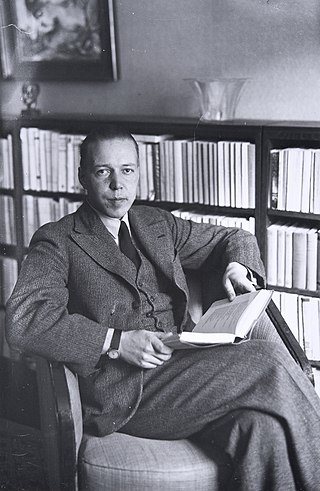
Mika Toimi Waltari was a Finnish writer, best known for his best-selling novel The Egyptian. He was extremely productive. Besides his novels he also wrote poetry, short stories, crime novels, plays, essays, travel stories, film scripts, and rhymed texts for comic strips by Asmo Alho.

Tove Irma Margit Ditlevsen was a Danish poet and author. With published works in a variety of genres, she was one of Denmark's best-known authors by the time of her death.

Sir Victor Sawdon Pritchett was a British writer and literary critic.
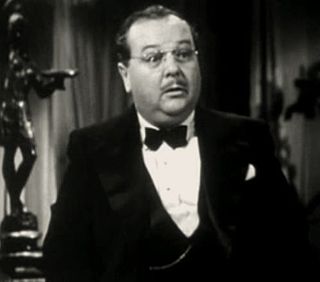
Lloyd Corrigan was an American film and television actor, producer, screenwriter, and director who began working in films in the 1920s. The son of actress Lillian Elliott, Corrigan directed films, usually mysteries such as Daughter of the Dragon starring Anna May Wong, before dedicating himself more to acting in 1938. His short La Cucaracha won an Academy Award in 1935.

Esko Nikkari was a prolific Finnish actor who made more than 70 appearances on film and television. He was born in Lapua, and made his screen debut in 1974 in the movie Karvat.

Arvid Mörne was a Finnish author and poet. He was nominated for the Nobel Prize in Literature four times.
Proletarian literature refers here to the literature created by left-wing writers mainly for the class-conscious proletariat. Though the Encyclopædia Britannica states that because it "is essentially an intended device of revolution", it is therefore often published by the Communist Party or left wing sympathizers, the proletarian novel has also been categorized without any emphasis on revolution, as a novel "about the working classes and working-class life; perhaps with the intention of making propaganda". This different emphasis may reflect a difference between Russian, American and other traditions of working-class writing, with that of Britain. The British tradition was not especially inspired by the Communist Party, but had its roots in the Chartist movement, and socialism, amongst others. Furthermore, writing about the British working-class writers, H Gustav Klaus, in The Socialist Novel: Towards the Recovery of a Tradition (1982) suggested that "the once current [term] 'proletarian' is, internationally, on the retreat, while the competing concepts of 'working-class' and 'socialist' continue to command about equal adherence".
Carl Erik Soya,, also known by the single appellation Soya, was a Danish author and dramatist. His works were often satirical provocations against double standards and dishonesty. In 1975, Soya received Denmark's foremost literary award, Grand Prize of the Danish Academy.
Morten Luther Gudmund Korch (1876–1954) was a Danish writer who wrote populist stories and romances about rural Denmark. During his lifetime, he was the most widely read author in Denmark. Korch wrote 123 novels, several of which were made into popular films. In 1937, Korch was awarded a Danish knighthood in the Order of Dannebrog. He is listed in the book of The 20th century's 100 most important people in Denmark.

Toivo Nestori Aro was a Finnish sportsleader and an aquatics athlete, who won 10 Finnish championships.
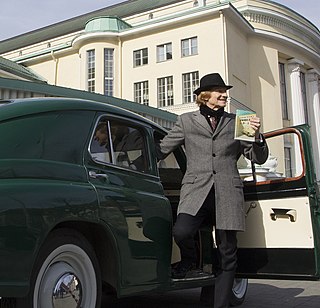
Ilmar Taska is an Estonian filmmaker and writer, who was writer and producer for 20th Century Fox movie Back in the USSR (1992) and producer for Candles in the Dark directed by Maximilian Schell. Ilmar Taska's 2016 novel Pobeda 1946 has been translated into many languages and was nominated for the Jarl Hellemann Translation Prize in Finland as best translated book of the year.
August Mälk was an Estonian writer and politician.
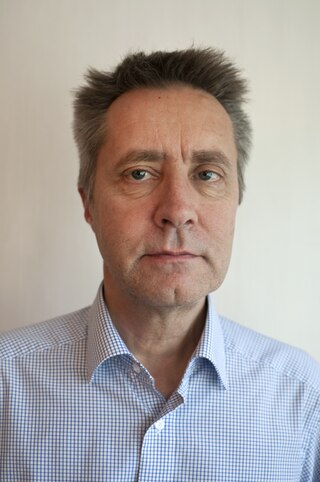
Hannu Veikko Luntiala is the former Director General of the Population Register Centre in Finland and an author for Tammi and Aviador Kustannus, both Finnish publishing companies.
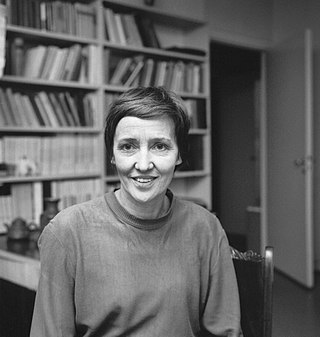
Elvi Aulikki Sinervo was a Finnish writer, poet, and translator. She was the recipient of the Eino Leino Prize in 1980. She married member of parliament Mauri Ryömä (1911–58). Their daughter is translator Liisa Ryömä.
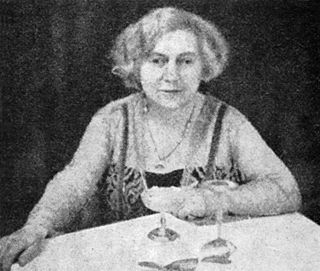
Karin Michaëlis was a Danish journalist and author. She is best known for her novels, short stories, and children's books. Over the course of 50 years, Karin Michaëlis wrote more than 50 books in Danish, German, and English. Her works have been translated into more than 23 languages from their original Danish. Her works are published under several names, including her last name from her second marriage: Karin Michaëlis Stangeland.
In Agatha Christie's mystery novels, several characters cross over different sagas, creating a fictional universe in which most of her stories are set. This article has one table to summarize the novels with characters who occur in other Christie novels; the table is titled Crossovers by Christie. There is brief mention of characters crossing over in adaptations of the novels. Her publications, both novels and short stories, are then listed by main detective, in order of publication. Some stories or novels authorised by the estate of Agatha Christie, using the characters she created, and written long after Agatha Christie died, are included in the lists.
This is a list of the writings of the American writer August Derleth.
Caja Rude née Løvgreen (1884–1949) was a popular Danish novelist, short story writer and journalist. Most of her works were for young women but she also wrote for adults. A keen supporter of women's rights, she frequently addressed the need for women to be better educated in order to become self-sufficient and take up jobs in industry. She covered women's affairs for the journal Social-Democraten. Her most popular work Kammerat Tinka (1938) emphasizes women's education, class consciousness and the need for a working-class culture.
Hans Christian Branner was a Danish novelist, essayist and playwright. He was a leading writer of the post-World War II period in Denmark and a founder member of the Danish Academy. His work dealt with the themes of power, fear and loneliness and earned him several literary awards including De Gyldne Laurbær, the Holberg Medal (1954) and the Danish Playwrights' Honorary Award (1961).












